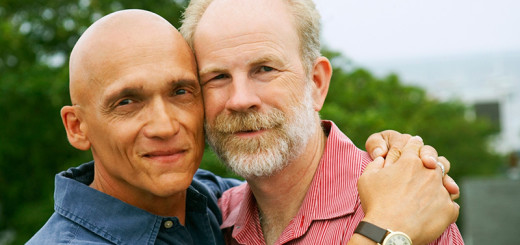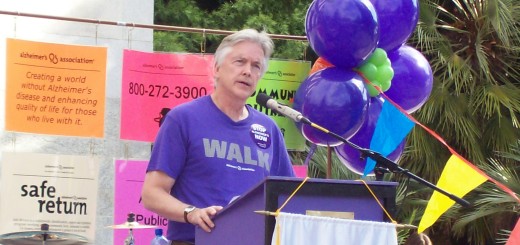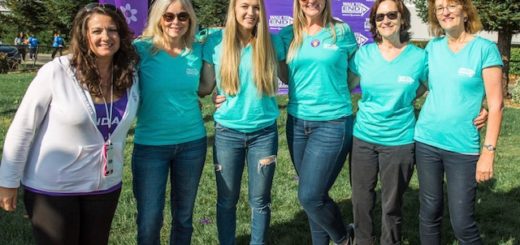Providing Support to Native Americans in the Central Valley
Ralph Vigil, whose mother has Alzheimer’s disease, knows how important it is to have support when caring for a loved one living with the disease. As a board member of the Fresno American Indian Health Project, he brings Native American families from multiple tribes together. His work helps connect Native Americans to resources as well as proving a wider community of people for support.
Finding community
When Ralph Vigil, a member of the Mountain Ute tribe in Colorado, first moved to the Central Valley, he had a hard time finding community. According to the U.S. Census Bureau there are currently more than 14,000 Native Americans living in Fresno and Madera counties. Despite this fact, because Ralph wasn’t a member of any the local tribes, he was considered an outsider.
Eventually, Ralph was able to connect with local Native Americans since many tribes carry similar traditions and beliefs. In 2006, Ralph was approached by the Fresno American Indian Health Project (FAIHP) to become a member of the board. Knowing first-hand how hard it is to find that community amongst tribes, Ralph applied and was accepted.
FAIHP is an organization that provides culturally-based health and wellness needs to Native American communities. “It’s a welcoming community of regional natives,” said Ralph. “They may not be from the local region, but they carry traditions and some of the philosophy of their tribes and their families. This is a place of support for people not on their native lands. It’s about health and wellness, and I’m a huge supporter of that.”
Hiding the signs
Shortly after becoming a member of FAIHP, Ralph and his family noticed that their mother was becoming more forgetful. “She hid her symptoms with jokes or arguments,” said Ralph. “She would start things and not finish them like making a blanket or cooking a meal. We assumed she was just tired, or it was her age. You never think it’s Alzheimer’s disease.”
Ralph’s mother was an independent woman. She was a talented seamstress, an excellent cook and spoke several languages. She was a very strong woman who faced a lot of adversity in her life and overcame that by being herself. It is hard for Ralph and his family to watch their mother lose her independence and forget where the restroom is in a house she had been living in for years.
Difficulty with a diagnosis
Native Americans are more likely to develop Alzheimer’s or other forms of dementia than White or Asian Americans. At the same time, American Indians overall have less access to healthcare and health services and are less likely to be diagnosed once they show symptoms.
According to the Alzheimer’s Association 2021 Alzheimer’s Disease Facts and Figures report, more than half (53%) of Native Americans believe that significant memory or cognitive losses are a normal part of aging. As many as 1 in 3 Native American Elders will develop Alzheimer’s or some other form of dementia.
Eventually, Ralph took his mother to see a doctor. However, he felt like her doctors didn’t want to deal with her cognitive decline or didn’t have the means to diagnose her. “The doctors insisted [her memory loss] was because of diabetes and high blood pressure,” said Ralph. “They wouldn’t address her memory issues.”
Difficulty getting care
The Facts and Figures report also states that 92% of Native Americans say that it is important for Alzheimer’s and dementia care providers to understand their ethnic or racial background and experiences. However, only 49% of Native Americans say that they have access to culturally competent providers.
Ralph found that there was a lack of resources and expertise on dementia in his area, especially for the Native American community. “You have native and non-native resources,” said Ralph. “You have more support in the Native world, but UCLA or Stanford [hospitals] might have more knowledge [on the disease]. There are some things that are unique to Native Americans in understanding the respect that goes with taking care of elders that may not be in Stanford systems.”
Additionally, word of mouth plays a huge role in finding care in the Native American community. “Word of mouth is stronger than what is on paper,” said Ralph. “If it’s a bad experience, people will say, ‘Why am I going to waste my time with that? I trust Auntie or Uncle with their experience, how will mine be any different.’”
Lastly, Ralph explains that Native Americans think beyond the individual. If there aren’t enough resources to go around, then it’s best to leave the resources for those who have a greater need. Because there are so few dementia resources in the Native American community, many families will not use them so that others, who are perceived to have a greater need, can have access to them. “We think of others first,” said Ralph. “If we think others may need it more than us, we tend to stay away.”
Family support
In 2017, Ralph’s mother, who was nearly 90, was diagnosed with Alzheimer’s disease. Ralph and his brother became the primary caregivers for their mother at that time. “Between brothers, sisters, wives and husbands, there are eight of us in all,” said Ralph. “My brother and I do the majority of care while the others help when a day task is needed, like a ride to the hospital or a cooked meal.”
In addition to caring for his mother, Ralph is also a parent to his own children making him part of the sandwich generation. “Trying to manage your life and pay for everything is a challenge. A dollar only goes so far but you have to make sure your elder is taken care of. While you’re tending to your parents you find your kids aren’t being tended to. You have to have your head on a swivel. Frustration builds up without support and the caregiver gets drained.”
Affordable care
Eventually, Ralph’s mother was placed in an adult day care during working hours, as Ralph and all of his siblings had to work. However, in 2020, when the COVID-19 Pandemic hit, finding care for Ralph’s mother became difficult. There was a lack of professional caregivers because everyone was trying to protect themselves from catching the disease.
Finding a care setting to care for their mother was also difficult because of financial reasons. The Facts and Figures report states that 61% of Native Americans say that affordability of care is a barrier. “You almost have to be without money to get assistance,” said Ralph. “If you want to qualify under the State, your finances have to be under a certain level. We would have had to move the money out of my mother’s name so she could get services. You have to get power of attorney in place and that costs money.”
Eventually, Ralph and his brother were able to find in-home care for their mother, which she still uses to this day.
Caregiver conference
In August, in 2022, the Alzheimer’s Association and FAIHP partnered together to provide an education conference for the Native American community. Ralph was the emcee for the event. The conference focused on connecting Native Americans with support and resources on Alzheimer’s and dementia.
“Caregivers need support,” said Ralph. “The conference was really insightful and knowing that this organization is growing is a huge piece for any community. A lot of people don’t acknowledge the disease because they don’t know that’s what they’re facing. It’s a matter of understanding the resources available.”
Look for resources
In caring for his mother, Ralph has figured out ways to work with his mother to make difficult situations easier. He doesn’t tell his mother what to do but instead, guides her into thinking things were her idea. “I set out towels and say, ‘Hey I set out the towels like you asked me to for your shower,’” said Ralph. “I’d tell her she made a good meal and sit and eat with her even though she didn’t make it. It smooths out the day.”
Today, Ralph’s mother doesn’t know who Ralph is, but he continues to sit with her and show her old pictures. “We reflect on the past,” said Ralph. “We find laughter in what we say.”
Ralph encourages other caregivers to utilize all of the resources available to them. “Look inside your lodge and outside your lodge,” said Ralph. “Know your landscape for support. Understand your landscape outside. On the inside you know what you need and what you need to communicate to fill any gaps. If you don’t have enough firewood you have to look outside. Where do I get my wood? Where are my resources? Use those to try and close those gaps.
“Everyone wants the kind of people who are the best as far as understanding and interacting. I want to encourage Native families and all families to not feel alone. That when they hurt, to be brave beyond the sadness and stress. As a caregiver, condition yourself for a social triathlon. Stay balanced with mind, body, spirit and origin.”
For more information on resources and support for Native Americans and Alzheimer’s disease visit alz.org/nativeamerican. For more information on Fresno American Indian Health Project visit faihp.org.
Learn more:




















